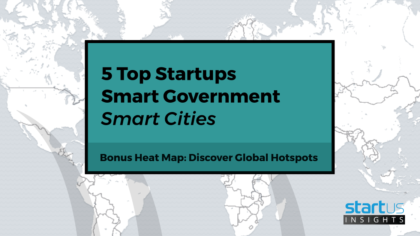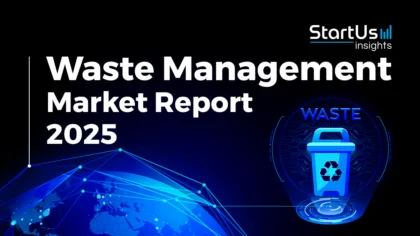Accelerate Productivity in 2025
Reignite Growth Despite the Global Slowdown
Our Innovation Analysts recently looked into emerging technologies and up-and-coming startups working on solutions for Smart Cities. As there is a large number of startups working on a wide variety of solutions, we decided to share our insights with you. This time, we are taking a look at 5 promising Smart Government Solutions.
Heat Map: 5 Top Smart Government Solutions
For our 5 top picks, we used a data-driven startup scouting approach to identify the most relevant solutions globally. The Global Startup Heat Map below highlights 5 interesting examples out of 271 relevant solutions. Depending on your specific needs, your top picks might look entirely different.
Civic Ledger – Government-To-Citizen (G2C) Smart Transactions
Smart government transactions open the door for a transparent and secure method to provide citizens with public services in cities. It simplifies the access for engagement between local authorities and citizens on issues regarding taxes, licenses, and documentation by providing a digital, transparent and personalized experience using blockchain, smart contracts, smart communications, data encryption, and other technology advancements for the government. Australian startup Civic Ledger leverages blockchain technology and smart contracts to create digital marketplaces for citizens to self-serve and manage government-granted entitlements like permits, licenses, and vouchers, as well as streamline the operation of patent registrations and distributed exchange platforms.
Civocracy – Civic Engagement Platform
Civic engagement platforms allow for sharing ideas and suggestions between citizens and the government regarding upcoming and potential projects in cities. Digital communication methods help authorities reach a wider, more diverse group of smart citizens. German startup Civocracy develops a platform for civic engagement, which connects local governments with their citizens to make collaborative decisions. Software features include city-led discussions, debates, real-time tracking, identifying their most active members, crowdsourcing ideas, and enables multi-level administration.
PromptGov – Addressing Citizen Grievances
Using smartphone applications, citizens now have the opportunity to report public service issues, while providing evidence in the form of photos or other media files. These applications activate the device’s GPS location for efficient routing of the required staff and management of the reported issues in one platform. The USA-based startup PromptGov provides a cloud-based civic assistance software to report issues using a mobile application, a social media agent or through Short Messaging Services (SMS). Grievances are visualized on a map for both citizens as well as for operators. They make use of Artificial Intelligence (AI) to manage the most commonly reported non-emergency requests. It can detect duplicate incidents and automatically prioritizes requests based on various factors such as the location, the scope of grievance and the availability of staff.
Polys – Online Voting System
Shifting to online voting platforms allows for expanding the voter base while getting citizens more involved in decision-making processes regarding any new policies. Web and mobile voting applications provide intuitive interfaces with projects descriptions, details, and instructions. Such a voting mechanism can increase voter turnout as citizens can cast votes from the convenience of their home or office. Russian startup Polys develops a voting system based on blockchain technology which significantly cuts the chance of manipulating the results for any vote. Their solution enables identification through SMS and smart cards for the integration with a client’s website or application. The system also ensures that all votes are cast anonymously to ensure voter privacy.
SWIM – IoT For City Infrastructure Management
Modern smart cities have several data sources, such as ticket sales of public transport systems, tax data, police reports, and sensors on roads and buildings which are continuously collected for further analysis. Internet of Things (IoT) city infrastructure platforms work to reveal patterns of interaction between citizens and infrastructure for further smart management, for example, in handling lesser-used city spaces or by creating traffic management or energy consumption policies. The USA-based startup SWIM develops an IoT platform which transforms raw data from smart city sensors and controllers into a real-time streaming API. Their solution utilizes edge computing with a “store-then-analyze” architecture to ensure high speeds and improved efficiency in data management for making important decisions regarding the city.
What About The Other 266 Solutions?
While we believe data is key to creating insights it can be easy to be overwhelmed by it. Our ambition is to create a comprehensive overview and provide actionable innovation intelligence for your Proof of Concept (PoC), partnership, or investment targets. The 5 startups showcased above are promising examples out of 271 we analyzed for this article. To identify the most relevant solutions based on your specific criteria and collaboration strategy, get in touch.



![Explore the 10 Emerging Smart City Trends [2025-2026]](https://www.startus-insights.com/wp-content/uploads/2025/06/Smart-City-Trends-SharedImg-StartUs-Insights-noresize-420x236.webp)




